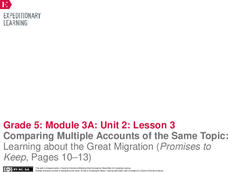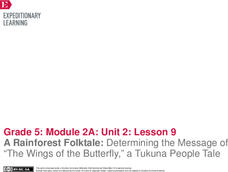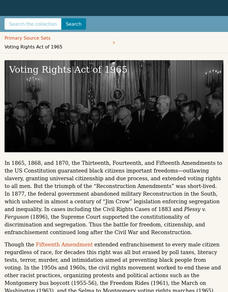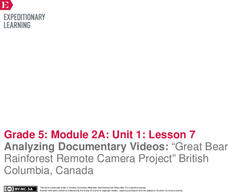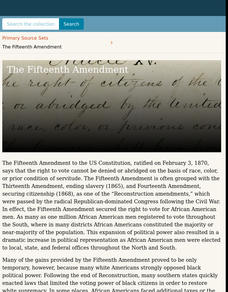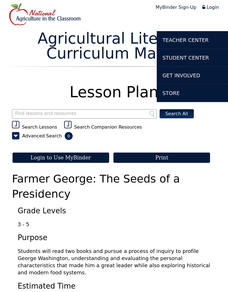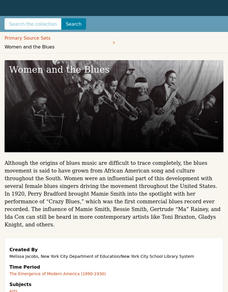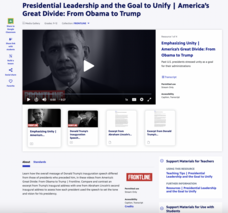EngageNY
Comparing Multiple Accounts of the Same Topic: Learning about the Great Migration (Promises to Keep, Pages 10–13)
Get the story straight. Scholars gather information about the Great Migration as they listen to a reading from Promises to Keep. They then examine the text to find evidence to support the feeling of resentment. Learners take part in a...
EngageNY
Using Quotes and Comparing and Contrasting Structure: The Invention of Basketball
Learners complete the third instructional activity in a row where they determine the gist of text and use quotes as textual evidence. They use details from Dr. James Naismith, Inventor of Basketball to explain how the development of...
Academy of American Poets
The Immigrant Experience
The Buttonhook by Mary Jo Salter is the focus of a unit that explores the immigration experience to Ellis Island. First, scholars bring in an artifact that represents their heritage. A group-exercise allows them to share and discuss...
EngageNY
Comparing Two Main Ideas in an Informational Text: Meg Lowman’s Methods for Researching the Rainforest (Pages 35–36)
Alike or different? Scholars compare and contrast the research methods used by Meg in The Most Beautiful Roof in the World. They record information about her research in a three column note catcher before answering text-dependent...
EngageNY
A Rainforest Folktale: Determining the Message of “The Wings of the Butterfly,” a Tukuna People Tale
Did you the message? Scholars listen to a read aloud of The Wings of the Butterfly to summarize and determine the message of the text. They discuss the folktale and vocabulary in groups, then use a double bubble map to compare the story...
Digital Public Library of America
Fannie Lou Hamer and the Civil Rights Movement in Rural Mississippi
Good primary resources, offering different perspectives on important issues and events, are hard to find. A packet of 12 primary source images, videos, audio recordings, records, and newspaper articles related to the 1960s civil rights...
Digital Public Library of America
Voting Rights Act of 1965
Despite the passing of the Thirteenth, Fourteenth, and Fifteenth Amendments, as well as the passing of the Voting Rights Act of 1965, the struggle to ensure fair voter registration and election procedures continues. Young historians...
Digital Public Library of America
The Underground Railroad and the Fugitive Slave Act of 1850
Escaping Enslaved people attempting to escape didn't need a ticket to ride on the Underground Railroad. Here is a packet of primary sources that reveal the kind of courage and determination they did need to face the challenges to gain...
Museum of the American Revolution
George vs. George
It's George versus George in the battle for the American colonies. An interesting activity compares the leadership of George Washington and King George III during the American Revolution. Scholars read text, compare portraits, and...
EngageNY
End of Unit 1 Assessment: Analyzing an Interview with a Rainforest Scientist Part 2 and Comparing and Contrasting Texts About Rainforest Biodiversity
The end is in sight. Pupils complete an end of unit assessment, analyzing an interview with a rainforest scientist and then comparing and contrasting two informational texts. Next, they complete a self-assessment to reflect on their...
EngageNY
Analyzing Documentary Videos: “Great Bear Rainforest Remote Camera Project” British Columbia, Canada
Lights, camera, action! Viewers discuss a video about the Great Bear Rainforest Remote Camera Project. As they watch, they find the gist, determine the meaning of unknown words, and analyze the features of a documentary as an...
Digital Public Library of America
Frederick Douglass and Abraham Lincoln
Frederic Douglass and Abraham Lincoln, although dissimilar in their backgrounds, were united in their views about slavery. A set of 14 primary sources permits scholars to examine the views of these two powerful men.
Digital Public Library of America
The Fifteenth Amendment
Fifteen primary sources provide a context for a study of the Fifteenth Amendment to the United States Constitution. The packet captures the excitement for the changes promised by the amendment as well as the backlash against it.
Digital Public Library of America
A Raisin in the Sun by Lorraine Hansberry
A set of 14 primary sources provides background for a study of Lorraine Hansberry's drama, A Raisin in the Sun. Featured are images from stage productions of the play, white supremacy protests, a clip from a television interview, and...
Digital Public Library of America
Women in the Civil War
Vivandieres and cantinieres, nurses and soldiers, loyalists and unionists. A primary source set provides young historians an opportunity to investigate the many roles women played in the United States Civil War.
Jane Addams Project
Woman Suffrage
Suffragettes, suffragists, and anti-suffragists. A two-day, richly detailed lesson plan has young historians investigate the twentieth-century suffrage movement. Groups examine primary and secondary source materials about Jane Addams and...
Digital Public Library of America
Beloved by Toni Morrison
Any classroom study of Toni Morrison's Pulitzer Prize-winning novel Beloved requires careful planning and scaffolding. A primary source set that includes a video, illustrations, photos of artifacts, and a broadside of the Fugitive Slave...
Roy Rosenzweig Center for History and New Media
George Washington: General, President, Slave Owner
Times change; behaviors that were once considered acceptable can be seen in a very different light. Middle schoolers revisit the legacy of George Washington in a three-day lesson plan that uses primary sources to reveal Washington as a...
Roy Rosenzweig Center for History and New Media
The Revolutionary Times as Seen Through the Eyes of Women
The role of women before and during the American Revolution changed dramatically. To gain an understanding of these changes, middle schoolers analyze primary source documents, including letters from women that supported the patriot cause...
Agriculture in the Classroom
Farmer George: The Seeds of a Presidency
Three activities make up a lesson that explores the connection between former president George Washington, the farming industry, and leadership. Scholars listen to two read aloud, Farmer George Plants a Nation by Peggy Thomas and George...
Digital Public Library of America
Women and the Blues
A 12-piece primary source packet sets the tone for a study of the role women played in the origins, development, and impact of blues music. Legends like Bessie Smith, Gertrude "Ma" Rainey, Mamie Smith, and Ida Cox are featured, as are...
National Park Service
The Battle of Stones River: A Contrast in Leadership Styles
US Commanding General William S. Rosecrans led the Union soldiers and Confederate Commanding General Braxton Bragg led the rebel army at the Battle of Stones River. Young historians compare how the leadership styles of these two...
EngageNY
Comparing an Author’s Presentation of Ideas: “Rachel Carson: Sounding the Alarm on Pollution”
It's all in the presentation. Readers take a look at author's presentation in the article Rachel Carson: Sounding the Alarm on Pollution. Scholars work together to complete a Comparing
and Contrasting Authors’ Presentation graphic...
PBS
Presidential Leadership and the Goal to Unify | America’s Great Divide: From Obama to Trump
Traditionally, a United States President's Inaugural Address establishes the tone and vision for his presidency. It has stressed the goal to unify the country and bring the political parties together after what are often divisive...


